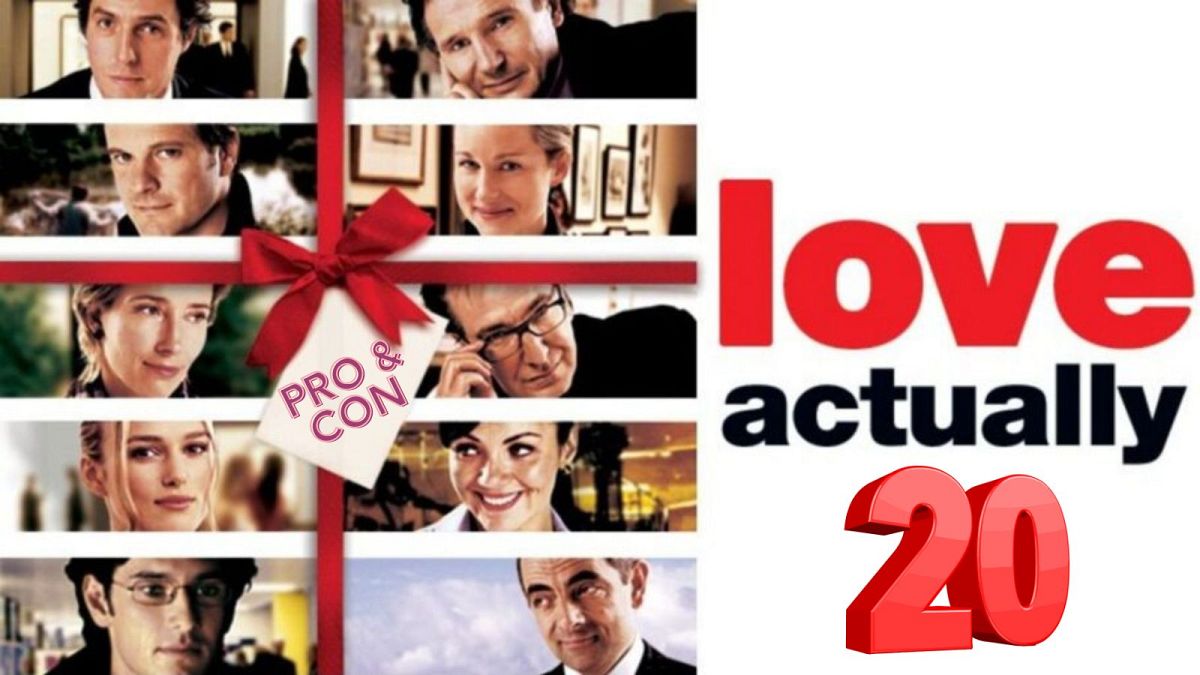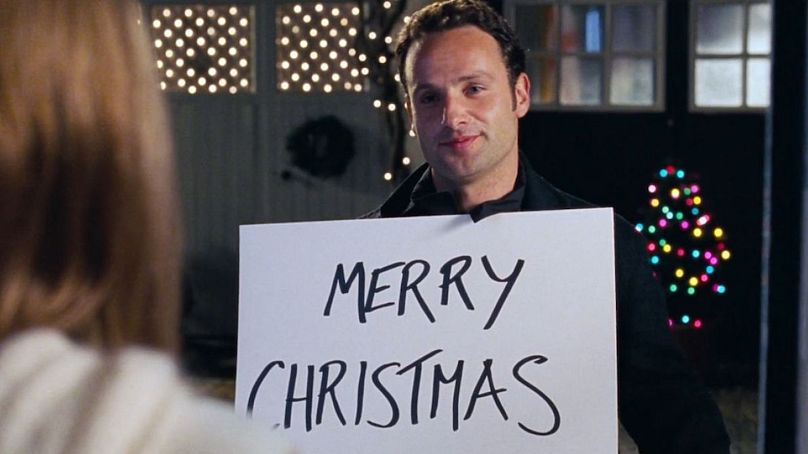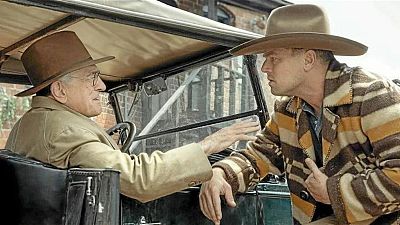Richard Curtis’ beloved Christmas classic turns 20 this month, and two of Euronews Culture’s team members disagree over whether it’s an anniversary worth celebrating.
In the PRO Love Actually corner is Jonny Walfisz and his fabulous hair, who argues that it’s a delightful fable and that love actually is all around.
In the CON corner is David Mouriquand and his bloodshot eyes, who has tried to get on board with the romcom but, after two decades, can’t get with the loving cheer.
We’ll let them try to convince you...
PRO: Richard Curtis’ Christmas-themed Canterbury Tales
By Jonny Walfisz
What makes a film a good Christmas film?
It’s hardly a goalpost that exists on equal pitches across individuals. I think Love Actually might just be in a league to claim the title though and that’s entirely due to its ability to encompass the polyphonic nature of Christmastime.
It’s all there in the opening monologue. Writer/director Richard Curtis gives Hugh Grant (playing himself again but this time as a Tony Blair analogue) the perfect set of lines to surmise the odd-yet-compelling intertwined vignettes to come.
“Whenever I get gloomy with the state of the world, I think about the arrivals gate at Heathrow Airport,” Grant’s Prime Minister David opines. “General opinion's starting to make out that we live in a world of hatred and greed, but I don't see that. It seems to me that love is everywhere.”
He goes on: “Often, it's not particularly dignified or newsworthy, but it's always there – fathers and sons, mothers and daughters, husbands and wives, boyfriends, girlfriends, old friends.”
It’s corny, overly sentimental and later in the speech there’s an egregious 9/11 reference. It was 2003, after all. It’s also accurate to the sentiment of Christmas throughout. Christmas is corny. It is sentimental. And damn it, there’s usually an uncle making egregious references.
If you haven’t actually seen Love Actually, and given this is an article celebrating its 20th anniversary, that’s nigh-on impossible, here’s a quick summary. Over the course of the holiday period, around 10 different plotlines weave in and out of each other as romances flair, hearts break, and friendships are affirmed.
Everyone has differing opinions of which plotlines they love and which they loathe. I adore one that features the recently widowed Daniel (Liam Neeson) as he traverses grief with his stepson Sam (a very young Thomas Brodie-Sangster) by plotting ways for Sam to impress his school crush.
From the comic mismatch of Neeson’s brooding angst against his stepson’s innocence to the euphoric airport chase so Sam can declare his love, this vignette is pitch-perfect Curtis. Throughout his movies, the common thread is the theme that nothing is a more powerful motivator than love and juxtaposing a child’s giddy romance with a husband’s grief demonstrates it deliciously.
There’s also, of course, the astonishingly painful plotline of Harry (Alan Rickman) as he’s caught in a love triangle between his secretary Mia (Heike Makatsch) and his wife Karen (Emma Thompson). Harry, Mia and Karen’s story is one of the sad strands to Love Actually, and Curtis fills it with layers of complexity.
When Harry buys Mia an expensive necklace while shopping with Karen, it’s none other than Rowan Atkinson playing the shop assistant. The jaw-clenchingly elongated scene of Atkinson wrapping the present as Harry fidgets fearful of being caught might seem tonally inconsistent with the severity of his actions. But Curtis understands that life’s emotions don’t always line up neatly. Sometimes something hilariously bizarre hits at the most inopportune moment. When it’s important though, Curtis pulls back and lets the moment ring out. When Karen realises the betrayal via unboxing a Joni Mitchell CD, the camera lingers on her. Thompson’s beautiful acting steals the entire film in this scene.
There are also the parts that miss. I’m no fan of the section where Colin (Kris Marshall) opines that American women will fancy him for his British accent. Creepy best man Mark (Andrew Lincoln) professing his undying love for his best friend’s wife Juliet (Keira Knightley) doesn’t come across well either. It's an unfortunate truth that Curtis also gives by far all the meatiest parts to his male characters.
Plotlines not working doesn’t undermine that Love Actually does work as a perfect Christmas film. For those gathering together, the lives and emotions leading up to the day are as varied as the individuals. That’s why Love Actually doesn’t need to follow a consistent emotional throughline. Christmas is just as much about love as it is about loneliness, heartbreak, and regret. True to Curtis though, love is always the driving force.
I could write a whole other essay about the way Curtis has never written literal films, instead preferring to create fables around the morality of love. About Time, for example, has questionable implications around consent if taken literally - but as a fable, its heart is golden.
The fable-like quality is at its most present in Love Actually. By combining so many threads, uneven as they are, Curtis has made his equivalent to a Christmas-themed Canterbury Tales.
As Curtis himself would put it: “If you look for it, I've got a sneaky feeling you'll find that love actually is all around.”
CON: Turtleneck porn about a moron who doesn’t back up his novel
By David Mouriquand
It’s so easy to hate on Love Actually that anyone who blasts it is swiftly labelled a sourpuss for taking yet another pop at the habitual seasonal whipping boy. I am not the first to condemn Richard Curtis’ ensemble schmaltz-fest, and I will probably push at some open doors here.
I get why people rush to it for Christmas. It's a harmless romcom, and as much as I do love me a raging rant, at no point do i rejoice in casting myself as a grinch that yucks other people’s cinematic yums. But Love Actually is legitimately terrible. There are no two ways about that.
Now, I’m no stranger to sentimentality and frequently bemoan fashionable arch self-consciousness that seems to be the enemy of a good bit of emotionalism. I also believe that no Christmas should be without reruns of a few classics: It’s A Wonderful Life; The Muppet Christmas Carol; George Cukor’s criminally underseen 1938 film Holiday with Cary Grant and Katharine Hepburn (not to be confused with 2006’s The Holiday); and most importantly, Home Alone 2: Lost in New York.
And I’ve tried with Love Actually. I really have.
Last December, I went with two of my friends to a Christmas movie marathon at Lyon’s Institut Lumière. They were showing back-to-back screenings of Die Hard, Gremlins, the beloved French comedy Le Père Noel est une ordure... And, of course, Love Actually. My friend Charlotte loves the film and I wasn’t about to ruin her enjoyment of seeing it again on the big screen by behaving like a jabbering film critic and sighing so loud it would have sounded like a dinosaur passing a kidney stone.
Instead, I behaved. More than that, I readied myself to be surprised, hoping that maybe, just maybe, it would all magically fall into place and I’d finally understand what my cold heart had been missing all these years.
It didn’t. I vicariously had a blast watching the waves of excitement on Charlotte’s face, but all I got out of it was how insincere the film all was. That, and how it’s not about love at all.
My Richard Curtis apologist colleague has handily provided you, dear reader, with a synopsis – and for this I am grateful, as I fear I may have been sick in a drain had I needed to resume the “plot” of this glib collage of clichés related to “love” and its permutations. There are entire media-academic PowerPoint presentations to fill about its problematic aspects: its repeated sexism; the glaring lack of female dialogue or agency; and the normalisation of stalking in the creepy Mark (Andrew Lincoln) and Juliet (Kiera Knightley) storyline.
20 years on, it’s still one of the most toxic depictions of romance and friendships I’ve ever seen on screen.
I’ll just keep it to my conviction that Love Actually is a film for people who misunderstand romance through an onslaught of two-dimensional male protagonists who exert some sort of power over the one-dimensional female characters, and pass it off as charming, quirky and romantic. There’s no meaningful or humorous relationship dialogue, and no mention of how loving connections are a to-and-fro between complicated people endowed with agency and desires. Nope – just longing thrust upon other people.
So, if it’s not about love, what is the film about?
Well, as far as I can tell, it’s a white middle class British fantasy and the cinematic equivalent of a particularly trite John Lewis advert about a moron (Colin Firth) who doesn’t back up his novel.
Granted, Love Actually has been hyperbolically destroyed over the years, and even construed as leave propaganda in the light of Brexit. Read Stephen Marche’s excellent 2018 essay for more on that.
I personally don’t subscribe to that too much – even if Curtis’ film does promote British isle exceptionalism to an embarrassing degree. Nor did I ever think that Love Actually was a manual for life, therefore not one to take too seriously.
So, to show that I’m not completely heartless or think that Curtis’ turtleneck porn is an act of cinematic terrorism, I can still identify three merits: Emma Thompson; that wee scamp dressed as an octopus for the school Christmas show; the Beach Boys’ ‘God Only Knows’ playing at the end, which cannot be tarnished as one of the greatest love songs ever recorded.
That’s it.
That’s not it, actually.
*Deep breath*
THE TITLE IS MISSING A SODDING COMMA AFTER THE ‘LOVE’ AND THE ‘ACTUALLY’, BECAUSE THE GRAMMATICALLY INEPT OMELETTES WERE TOO BUSY CYNICALLY CROWBARRING IN THAT 9/11 NOD IN THE OPENING MONOLOGUE TO MANIPULATIVELY TUG ON SOME HEARTSTRINGS THAT THEY COULDN’T EVEN BE BOTHERED TO MAKE 'LOVE ACTUALLY’ MAKE ANY SYNTACTIC SENSE.
That's it.
Happy 20th Love Actually. I’ll be rewatching Home Alone 2. Adptly, as I'm probably not invited to Jonny’s for Christmas.




